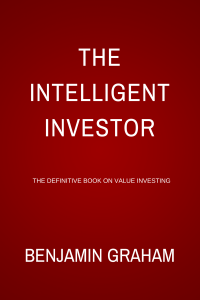If you missed our first part, check out our initial review of The Intelligent Investor. This is part 2 of The Intelligent Investor Book Review.
Investing can sound like a risky game of speculation to some people. Actually, I’d say most professionals I talk to about the stock market always bring up the fact that “it’s risky to invest today.”
I can’t tell if they’re trying to give me insight on how the market works or if they’re really not sure what they’re talking about.
Here’s the thing: there’s always going to be an element of risk when it comes to investing. Always.
We can’t control the stock market. We can’t control company earnings. We can’t control inflation.
The only thing we can control is our behavior.
Hang in there with me – I’m not getting all sappy on you.
Benjamin Graham (the father of investments) put it simply:
“The Future of security prices is NEVER predictable”
He goes on to explain the difference between Investment and Speculation – which ties into his belief that our behavior is the underlying agent of success when it comes to investing.
Speculative Investors Vs. Defensive Investors
Investments are opportunities that allow for safety of principal and adequate return.
Speculation refers to opportunities that don’t meet these requirements. (Think the ‘hot stock picks’ or ‘latest trending investments’ or – dare I say – the latest precious metal push that we on TV…)
Who is the Speculative Investor?
A speculative investor is someone who loves the thrill of finding the stock that is “hot” and that other’s can’t stop talking about. They think they’re investing by picking the best stock, confusing it for investing. Even worse is when a speculative investor is relatively new and is using their 401(k) to speculate in the market. Graham straight up calls this gambling.
He doesn’t say that gambling is wrong. He just wants to make it clear that it is NOT investing and that speculating in hopes of a greater return will usually result in the opposite.
Who is the Defensive Investor?
The defensive investor isn’t a glamorous title by any means. It isn’t exciting; it isn’t sexy; it isn’t thrilling. The defensive investor avoids speculation and looks for opportunities for true investment.
Graham made it clear in the first chapter of his book The Intelligent Investor that an intelligent investor is disciplined and defensive.
The defensive investor is systematic. Here’s an example of a systematic approach to choosing the right investment allocation as outlined by Graham:
The allocation of stocks to bonds should never be less than 25% or more than 75%(in both cases bond-to-stock or stock-to-bond ratio).
Adjustments should be made to rebalance the investments when a 5% change has been made.
In high markets, the defensive investor may choose to decrease the stock portion of his investments to 25%. During a decline in the market, he may choose to increase his stock balance up to 75% if he feels that the market decline is significant.
Wait a minute? Where’s the investment advice?
Ok – so a 25/75 mix of stock/bond or bond/stock doesn’t sound like much advice from our buddy Ben Graham.
That wasn’t his intent. His intent was for investors to start thinking intentionally about their investing strategy. His intent was for investors to realize that there is no way to outsmart the market and to choose the ‘winners’ or ‘losers.’ Doing so will usually result in a losing portfolio.
If we want to become intelligent investors, we need to adopt the behavioral tendencies of an intelligent investor. Graham finishes the first chapter by giving a taste of a couple well-tested investing strategies that will be outlined in detail later:
Find well-established investment funds instead of creating your own common-stock portfolio.
Use the principle of “dollar-cost averaging” – buying shares a little over time instead of a lot all at once.
The bottom line is that anyone can become an intelligent investor if they change their behavior. Are you willing to make the change?

Leave a Reply